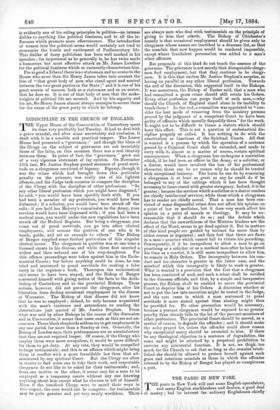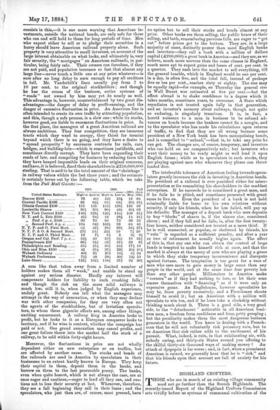THE PANIC IN NEW YORK.
T"panic in New York will cost some English speculators, and many English stockbrokers and dealers, a good deal of 'motley; but its interest for ordinary Englishmen chiefly consists in this,—it is one more warning that American in- vestments, outside the national bonds, are only safe for those who can and will hold to them for long periods of time. Men who expect either to sell or to pledge their securities in a hurry should leave American railroad property alone. Such property is very attractive to small investors, on account of the large interest obtainable on what looks, and ultimately is, very fair security, the " mortgages " on American railroads, in par- ticular, being fairly safe. Their owners can foreclose, if they are not paid, and population increases so fast that almost any large line—never touch a little one at any price whatever—is sure after no long delay to earn enough to pay all creditors in full. Mr. Vanderbilt's lines usually pay from 7 to 10 per cent, to the original stockholders ; and though he has the cream of the business, entire systems of " roads " not owned by him may yet do nearly as well. This advantage is' however, counterbalanced by two great dis- advantages—the danger of delay in profit-earning, and the danger of excessive fluctuation in price. An American line is often intended to create its own traffic by attracting population, and this, though a safe process, is a slow one ; while its stocks however good, are liable to enormous fluctuations in price. In the first place, the managers of a great American railroad are always ambitious. They fear competition, they see immense tracts which they want to occupy, they thirst for termini beyond which there is no going, and they have a desire to "spread prosperity" by enormous contracts for rails cars, bridges, and building-lots—which is sometimes justifiable, and sometimes directly corrupt. They have been expanding their roads of late, and competing for business by reducing fares till they have heaped impossible loads on their original concerns, and have, it is believed, fined their shareholders in £250,000,000 sterling. That is said to be the total amount of the "shrinkage" in railway values within the last three years ; and the estimate is certainly borne out by the following table, which We take from the Pall Mall Gazette :- 188-2. 1883. Fall
,----,--„— -A- — —,188 I. since United States Hallways. High'st. Low'st. High'st. Low'et. May. I802.
Denver $100 Central Pacific $100 Illinois Central $100 Louisville Shares New York Central $100 N. Y. and L. Erie $100 „ Prof. 6 p. c. $100 „ Second Pref. 6 p. c.
N. Y. P. and 0. First Mort.
N.Y. P. & 0. & Second Mort N. Y. P. and 0. Third Mort
Oregon and Cal. Prof. 7 p. c Pennsylvania $50 Philadelphia and Reading Ohio and Miss. $100 Wabash Ordinary Wabash Preference Lake Shore
A sum like that taken away from a limited number of holders makes them all "weak," and unable to stand up against any serious disaster. Hardly any interest will compensate holders for liability to such crushing falls ; and though the risk on the more solid railways is much less, still it is when judged by English experience, unduly great. Nobody can tell what the managers may attempt in the way of annexation, or when they may declare war with other companies, for they are very often net the agents of the stockholders, but of leviathan specula- tors, to whom these gigantic efforts are, among other things, exciting amusement. A railway king in America looks to profit, but he looks to it as a European conqueror looks to territory, and if he wins is content, whether the campaign has paid or not. One grand annexation may cancel profits, and one great failure throw into the market half the stock of a railway, to be sold within forty-eight hours.
Moreover, the fluctuations in price are not wholly depenflent either on new enterprises or on traffics, but are affected by another cause. The stocks and bonds of the railroads are used in America by speculators in their businesses to an extent hardly known in Europe. They keep their capital in them, deposit them in the banks, and borrow on them to the last procurable penny. The banks, even when quite honest, which is not always the case, are at once eager and cautious,—eager to lend all they can, and cau- tious not to lose their security at last. Whenever, therefore, they see a fall beginning they call in their loans ; and the speculators, who just then are, of course, most pressed, have
76 401 52% 231 12 • 61 95 921 91f 631 39/ 551 155 135- 152f 128/ 122 33 991 501 601 431 361 63 140/ 1281 1261 1161 109 311 451 344 42 28/ 14 31% 90 70 86 74 38 52 104 944 1021 93 64 40 62 421 581 391 341 271 27% 141 22% 10 71 20 13
7-1- 91
5 31 9% 521 40 50% 341 19 321 661 55% 661- 57% 59 6% 35% 251 301 211 171 18 42 31% 37% 23% 201 211 401 25 361 161 61 34 72/ 48 581 301 131 59 1221 1021 118% 97% 92 301
no option but to sell their stocks and bonds almost at any price. Other banks see them selling, the public hears of their selling, and both, remembering previous falls, are eager to "get out" before prices get to the bottom. They are, in a large majority of cases, distinctly poorer than most English banks and investors—they call a bank with a million of dollars capital (X200,000) a great bank in America—and they are, as we believe, much more nervous than the same classes in England, much more apt to expect gains and losses of cent. per cent. in a quarter. They rush into the market to sell everything, till the general tumble, which in England would be one per cent. in a day, is often five, and the total fall, instead of perhaps five or ten per cent., reaches sixty or eighty. The rise may be equally rapid—for example, on Thursday the general rise in Wall Street was estimated at five per cent.—but the effect abroad is to shake confidence to a degree which it takes months, sometimes years, to overcome. A State which repudiates is not trusted again fully in that generation, and an investor's memory about railways, though not quite
so enduring, is singularly tenacious. It is, in fact, a horrid nuisance to a man in business to be refused ad- vances on bonds because the bankers cannot fix a margin, and to the speculator who has made his calculations upon returns of traffic, to find that they are all wrong because some president of a New York bank has been monopolising bonds, and is compelled to "unload,"—that is, to take any price he can get. The changes are, of course, temporary, and investors who can hold on are comparatively safe ; but investors who want their money to be ready might as well lend it upon English farms ; while as to speculators in such stocks, they are playing against men who whenever they please can throw loaded dice.
The intolerable tolerance of American feeling towards specu- lators greatly increases the risk in investing in American bonds. No president of a railroad is ever punished either for misre- presentation or for committing his shareholders to the maddest enterprises. If he succeeds he is considered a great man, and if he fails he is pitied, and sometimes presented with great sums to live on. Even the president of a bank is not held criminally liable for loans to his own relatives without security, if only his friends, when he has failed, will pay up his defaults. The manager of a deposit bank who uses deposits to buy "blocks" of shares is, if the shares rise, considered clever ; and if they fall and he fails, is, after the first twenty- four hours, neither considered nor treated as a mere thief. If he is well connected, or popular, or sheltered by friends, his " ruin " is regarded as a sufficient penalty, and after a year or two of retirement he usually begins again. The effect of this is, that any one who can obtain the control of large funds is tempted to make himself rich at once, and that the market is always at the mercy of men who are playing a game in which they stake temporary inconvenience and disrepute against fortune. The temptation is too great for a race of men who care more to gain money in large sums than any people in the world, and at the same time fear poverty less than any other people. Millionaires in America make "corners" as if they had nothing to lose, or let their sons amuse themselves with " financing " as if it were only an expensive game. An Englishman, however speculative he may be, fears poverty excessively, and a Frenchman shoots himself to avoid it; but an American with a million will
speculate to win ten, and if he loses take a clerkship without thinking much about it. There is a good side, a very good side, to the " detachment " noticeable in all American busi- ness men, a freedom from sordidness and from petty grasping ; but the peculiarity makes them the most dangerous business gamesters in the world. You know in dealing with a French- man that he will not voluntarily risk pecuniary ruin, but to an American that risk rather adds to the excitement of his pursuit. What, indeed, is ruin, in that exhilarating air, with
nobody caring, and thirty-six States around you offering to the skilful thirty-six thousand ways of making money ? An attack of dyspepsia is far worse ; and, in fact, when a prominent
American is ruined, we generally hear that he is "sick," and that his friends upon that account are full of anxiety for his future.



































 Previous page
Previous page